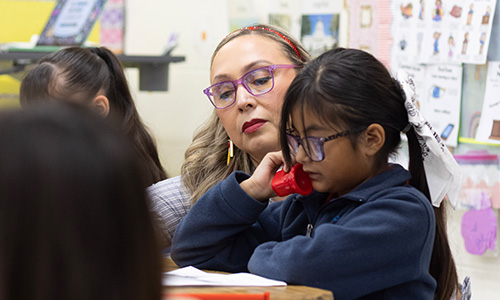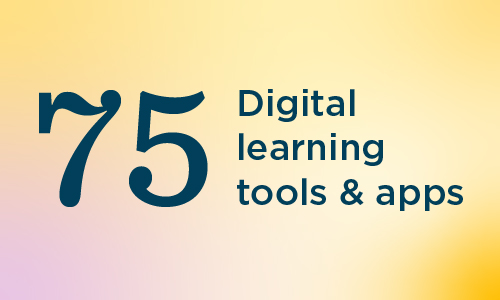
Imagine that you wish to learn a new sport. Typically, you would observe others play the sport in action to gain an understanding of its techniques and dynamics. However, now imagine that your coach never allowed you to actively participate and merely requested you to watch as they demonstrated the game. Would this passive observation lead to mastery? At a certain point, would you lose interest in learning this new sport? While vicarious experiences are important for building confidence, everyone requires abundant opportunities to practice and develop their skills to comprehend the fundamentals and attain mastery. For that reason, it’s important for instructional coaches to understand different approaches to instructional coaching.
Defining coaching
At NWEA, our definition of instructional coaching is “a collaborative process centered on a cycle of inquiry, action, and reflection to inspire instructional excellence and an exceptional student learning experience. Our sustained partnerships build educator efficacy through evidence-based, research-driven methods.”
Not only do we believe that, but research also consistently demonstrates that coaching is a multifaceted process that involves empowering individuals to set their own goals and determine the most effective approach to achieve them, thus fostering a sense of ownership and empowerment. A coach utilizes critical skills such as active listening and strategic questioning to guide individuals through their professional development journey. It’s important to note that coaching is not about imposing a set agenda but, rather, adapting to the evolving needs and goals of the individual. While advice or opinions may be offered, they are given sparingly and are only provided when explicitly sought by the coachee.
In my experience, coaching generally takes more time than consulting. A full coaching cycle with a teacher can often require up to ten hours of face time with the coach over a quarter or semester. This is because as a coach first enrolls a teacher into coaching, they ask questions to understand the teacher’s experience level, approach to teaching, and current student needs. Then the coach guides the teacher through a process of questioning to select a focus in the form of a measurable and meaningful goal that will make a big impact on their teaching practice and the students in their classroom. The coaching cycle requires time for the teacher to try out new strategies, review and explore data with the coach, and make adaptations along the way.
Coaching is simply not an overnight process, especially when factoring in the unpredictable events of a teacher’s day-to-day work. Recently, while I was meeting with a teacher during their planning period, the fire alarm went off unexpectedly. Instead of analyzing student work, we were herding students onto the playground. This is the daily reality of being a teacher, and it’s precisely why a coach must be flexible and adaptable to a teacher’s current reality.
Understanding the role of consulting
Consulting, on the other hand, is more directive in nature and involves providing expertise that the coachee may not possess. While it is also goal-oriented, consulting focuses on delivering practical, actionable steps to help coachees meet their objectives. Unlike coaching, consulting sessions can be comparatively shorter and are more tailored to sharing specific information or demonstrating particular practices.
For instance, if a teacher needs to quickly understand how a specific teaching strategy looks in practice, a coach can take a consultative approach and model that practice live with students or provide a video of the practice in action. Likewise, a small team of teachers may need to better understand the different MAP® Growth™ reports to explore recent data from their students’ fall assessment, thus a coach can provide a walkthrough of the purposes of accessing different reports. In this context, consulting is much more technical and simply provides needed information or experience but does not necessarily lead to long-term capacity-building in teachers.
Recognizing the right approach
It’s essential for instructional coaches to understand different approaches to instructional coaching and be able to discern when to apply a consultative stance as opposed to a coaching approach.
An effective coach has the skill to shift between both stances for the benefit of the teacher but understands the true power of coaching. Simply solving others’ problems, rushing to rescue them, or telling them what to do just doesn’t lead to meaningful learning or capacity-building in a teacher’s practice. By granting teachers the time and space to analyze, experiment, and reflect on their practice, instructional coaches can pave the way to profound professional development and capacity-building in educators.
Expanding on the benefits of coaching
Coaching offers several unique benefits that differentiate it from traditional consulting approaches. Firstly, coaching promotes a deep level of self-awareness and introspection among educators. By encouraging them to set their own goals and reflect on their progress, coaching nurtures a sense of personal accountability and ownership over their professional growth journey.
Furthermore, coaching fosters a growth mindset among educators, emphasizing continuous improvement and development. Through ongoing feedback, support, and collaborative inquiry, coaches empower teachers to embrace challenges and view setbacks as opportunities for learning and growth. This transformational approach not only enhances teacher efficacy but also translates into improved student outcomes and classroom dynamics.
Balancing coaching and consulting
While coaching and consulting serve distinct purposes in the realm of educator professional development, finding the right balance between the two approaches to instructional coaching is key to maximizing their impact. When faced with a situation that requires immediate expertise or guidance, a coach may choose to adopt a consultative stance to provide timely support and solutions.
On the other hand, when the goal is to facilitate deeper reflection, skill development, and capacity-building, coaching emerges as the preferred approach. By engaging teachers in thoughtful dialogue, goal-setting, and ongoing support, coaching instills long-lasting changes in practice and mindset that extend far beyond the duration of a single coaching session.
In conclusion, coaching and consulting play pivotal roles in shaping the professional growth and development of educators. While consulting offers targeted expertise and immediate solutions, coaching nurtures deep reflection, self-directed goal-setting, and sustainable capacity-building in teachers.
By embracing both coaching and consulting approaches within a comprehensive professional development framework, schools can cultivate a culture of continuous learning, innovation, and excellence. Investing in coaching as a transformative practice is an investment in the future of each student a teacher will serve throughout the rest of their career and empowers teachers to realize their full potential and have a meaningful impact on the lives of their students.
Read more about instructional coaching here on Teach. Learn. Grow.




